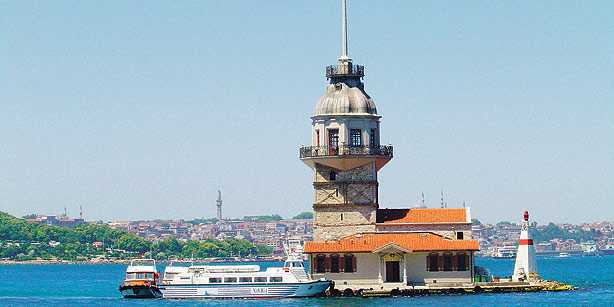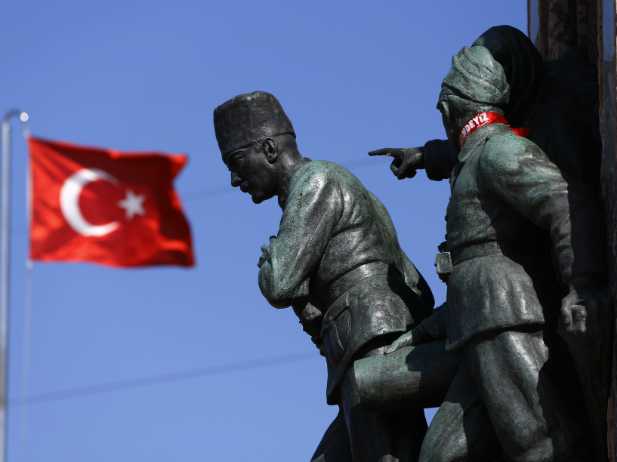In the aftermath of the Georgian-Russian confrontation, Ankara sees an opportunity to expand its trade relations with Central Asia, particularly the rising petro-states of Kazakhstan and Turkmenistan. Seeking to capitalize on the changing geostrategic environment for Caspian energy exports, Turkish Parliamentary Speaker Koksal Toptan, accompanied by other MPs, has undertaken a tour to Kazakhstan and Kyrgyzstan. On October 19 Toptan began his tour with a four-day official visit to Astana (Aksam, October 20).
Not surprisingly, energy was a major theme of Toptan’s visit. Turkey has already profited from Astana’s commitment to use the Baku-Tbilisi-Ceyhan pipeline, as BP-Azerbaijan executives announced that later this month Kazakhstan would begin pumping Kazakh oil from its massive Tengiz field into the BTC (UPI, October 15).
Under the arrangement, Kazakh tankers will ship about 98,000 barrels per day (bpd) of Tengiz oil, or slightly less than 10 percent of BTC’s one million bpd throughput capacity, across the Caspian to the BP-led consortium’s Sangachal Terminal on Azerbaijan’s Abseron Peninsula for pumping into the BTC pipeline and transmission to Turkey’s Mediterranean port at Ceyhan. Building on the Kazakh commitment, Toptan told a group of Kazakh academicians and students at the Public Administration Academy, “I invite Kazakhstan to participate in big energy projects such as the Samsun-Ceyhan oil pipeline and the Ceyhan refinery”(Anadolu Ajansi, October 21). Following his discussions with Toptan, Nazarbayev in turn urged Turkish businessmen to invest in Kazakhstan.
The 345-mile-long, 1.5 million bpd Samsun-Ceyhan oil pipeline (SCP, also known as the Trans-Anatolian Pipeline) is designed to link Turkey’s Black Sea port of Samsum with Ceyhan. It will parallel the BTC by using its corridor from Sariz, and has an added advantage of providing an alternative route for Russian and Kazakh oil exports from Russia’s Black Sea port of Novorossiysk. The SCP, given that its throughput capacity would be 50 percent greater than BTC, could greatly ease the tanker traffic through the Bosporus and Dardanelles, a rising environmental and security concern for Turkish officials.
Toptan’s trade agenda is hardly limited to energy issues, however. During his meeting with Kazakh Parliament Senate Chairman Kassym-Jomart Tokayev, Toptan told a press conference, “Our trade volume currently stands at $2.5 billion. We aim at bringing it up to $5 billion by the year 2010. Direct investments by Turkish businessmen in Kazakhstan amount to $2 billion, and their construction services total $8.5 billion”(Anadolu Ajansi, October 20).
Turkey’s trade with Kazakhstan’s eastern neighbor Turkmenistan is also growing. According to Turkmen President Gurbanguly Berdimukhamedov, Turkish investment in Turkmenistan has slowly and steadily increased, reaching $2.7 billion in the past 18 months. Berdimukhamedov noted, “Our countries have always had good relations. In the new stage of its development, Turkmenistan plans to make cooperation with Turkey more intensive” (EDM, October 8).
In Ankara’s calculations it is critical to diversify its energy imports in order to sustain the economic growth of the last four years, during which the Turkish economy has grown annually by more than 7 percent, making the country the 6th biggest trading partner of the European Union and giving Turkey the world’s 20th largest economy (www.deik.org.tr).
While current Turkish trade with Central Asia is dwarfed by its $38 billion annual turnover with Russia, the energy assets of former Soviet republics Azerbaijan, Kazakhstan, and Turkmenistan are impelling Ankara to make a determined effort to acquire a significant portion of their energy assets, or, failing that, to ensure that they transit Turkey on their way to the global market.
Furthermore, despite the three nation’s long association with Moscow, Turkey has the added negotiating advantage of deep linguistic, cultural, and religious ties that Russia signally lacks. The most notable sign that Turkey is determined to play its cultural card is the fact that Nazarbayev and Toptan discussed the efforts of Turkey and Kazakhstan to establish a Parliamentary Assembly of Turkish Speaking Countries, first broached by Nazarbayev in November 2006 (EDM, February 29).
Turkey’s other rising rival for Caspian energy assets is China. According to Guoxiang Sun, the Chinese ambassador to Ankara, in 2007 bilateral trade between Turkey and China totaled $14.26 billion, and Beijing “expects it to increase by 50 percent” (www.deik.org.tr).
Further east in the “Stans,” distance and geographical isolation serve to diminish Turkish trade ties, resulting in less than a quarter of Ankara’s trade with Kazakhstan. In Uzbekistan there are over 470 Turkish-Uzbek joint ventures, with annual bilateral trade between Uzbekistan and Turkey now standing at about $600 million per annum (Informatsionnoe Agenstvso, www.fergana.ru, August 31, 2007). Tashkent’s conservative fiscal policies have combined with the country’s geographical isolation from Turkey to limit a dynamic increase in bilateral trade for the foreseeable future.
Turkish-Tajik bilateral trade is also growing slowly, hampered by Tajikistan’s geographic isolation, political and economic instability, corruption, and an underdeveloped domestic financial system. In 2007 bilateral trade between Tajikistan and Turkey reached $500 million, only a 16 percent increase over the previous year (Avesta, July 7). In 2006 Turkish-Tajik bilateral trade totaled $420 million (Avesta, January 10, 2007). Tajikistan nevertheless remains keenly interested in cooperating with Turkey in the economic, hydroelectric power generation, and tourism sectors; but the aforementioned constraints will preclude dynamic growth.
Kyrgyzstan has the smallest trade turnover with Turkey of all the “Stans.” Speaking last month in Ankara at the Fifth Turkey-Kyrgyzstan Joint Economic Commission, Turkish Minister of Industry and Commerce Zafer Caglayan noted, “Although relations with Kyrgyzstan are improving in all areas, we do not think they have reached adequate levels,” commenting that while bilateral Turkish-Kyrgyz trade would reach $250 million by the end of 2008, “There is nothing stopping us from reaching an annual trade volume of $1 billion” (Zaman, September 6).
While Turkey’s pressing needs for energy import diversification have in the short term led it to focus its attention on the westerly “Stans” with the most abundant energy resources, both Ankara and the Central Asian nations share a common interest in resisting both Moscow’s influence and China’s growing economic dominance.
Given that Turkey and the “Stans” share a common linguistic, religious, and cultural heritage, the Parliamentary Assembly of Turkish Speaking Countries, which by its very definition would exclude Russian and Chinese membership, may well develop a dynamic of its own among the politicians in Turkey, Kazakhstan, Kyrgyzstan, Tajikistan, Turkmenistan, and Uzbekistan.
As NATO and the Shanghai Cooperation Organization increasingly stake out their claims to Eurasian spheres of influence, the Parliamentary Assembly of Turkish Speaking Countries, by concentrating on cultural and economic issues, may well prove a haven for its members who might well wish to sit out the opening stages of the new Great Game.






